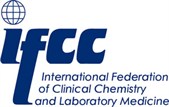How should Glucose Meters be Evaluated in Critical Care (WG-GMECC)
The IFCC Working Group on How should Glucose Meters be Evaluated in Critical Care (WG-GMECC), - under the IFCC POCT Committee, has completed a document on
“How Should Glucose Meters Be Evaluated for Critical Care”
It addresses the clinical practice of using Blood Glucose Meters (BGM) and what requirements they must fulfill in order to be used in critically ill patients and in Professional Healthcare Settings (PHS) on patients in various states of health and receiving intensive medical intervention and therapy.
The document is already available for download. A second document addressing quality management and training and competency recommendations for BGM is under development.
The WG was convened in 2014 after the US Food and Drugs Administration (FDA) issued its draft guidance on blood glucose test monitoring systems for “prescription” use and concerns about the accuracy and risks of using BGM for acutely ill patients were being widely raised.
The WG has been an inclusive one with 12 members, 10 corresponding members, 3 corporate members, and 6 advisors. It has been chaired by Cynthia Bowman (US) who, along with Sean Cunningham (IE), Robbert Slingerland (NL), Dieter Mesotten (BE), Brad Karon (US) and James Nichols (US), authored the document. Input from all WG participants was broad-based, open, and active, including corporate members.
Time was taken to develop agreement on core principles and recommendations from all participants and to account for the evolution of recommendations, technology and perspectives in the field of BGM. The WG elected to cover the topic with some technical and clinical depth to allow readers and stakeholders to have a resource on principles of the technology and clinical issues that must be considered when evaluating BGM for critically ill and PHS patients.
The WG agreed that all users of BGM must be aware of their limiting technical and clinical factors, that evaluation and oversight of BGM must be practical and respect resource constraints, but that there must be a single international standard for BGM performance and evaluation in critical care and PHS settings. At the current time, the WG does not recommend using capillary samples for BGM with critically ill or PHS patients, as described above. Options for monitoring glucose levels in those patients include using alternative instruments or using arterial or venous samples with BGM cleared for those samples. However, the WG is aware that vendors and groups have data promoting the use of capillary samples for critically ill and PHS patients. An FDA public advisory committee meeting will receive testimony supporting that use on March 30, 2018.
The WG is hoping that the document will stimulate active multi-specialty discussion in many settings and will serve to foster collaborative awareness and best practices between laboratory, clinical, and corporate stakeholders for BGM. Many of the principles included in the document are general ones applying to good laboratory and clinical practice for POCT in general. It is also hoped that this document and topic will be an ongoing discussion in inter-society meetings with an evolution of recommendations and practices for current and future technologies. Using the principles of the document could promote a good basis for ongoing partnership with laboratory, clinical, and corporate stakeholders in dealing with other laboratory testing issues.
|
The WG-GMECC looks forward to your feedback and fruitful interactive discussions with you. |
WG-GMECC Membership
| Name | Position | Country | Term | Time in Office |
| C. Bowman | Chair | US | extra term | 2019 01 - 2019 12 |
| E. Bigot-Corbel | Member | FR | ||
| S. Cunningham | Member | IE | ||
| E. Guillen Barua | Member | PY | ||
| P. Luppa | Member | DE | ||
| T. Malati | Member | IN | ||
| D. Sacks | Member | US | ||
| R. Slingerland | Member | NL | ||
| B. Solnica | Member | PL | ||
| P. St.Louis | Member | CA | ||
| F. Vanstapel | Member | BE | ||
| R. White | Member | AU | ||
| M. Mulder | Corp. Rep./Roche | DE | ||
| E. Ntrivalas | Corp. Rep./Nova Biomedical | UK | ||
| D. Bruns | Advisor | |||
| B. Clarke | Advisor | |||
| B. Karon | Advisor | |||
| D. Mesotten | Advisor | |||
| J. Nichols | Advisor | |||
| M. Scott | Advisor |
Terms of Reference
- Evaluate the clinical practice of using blood glucose meters for critically ill patients.
- Determine the requirements a glucose meter need to full fill in order to be used for critically ill patients
- Propose what internal- and external quality control systems that should be present.
- Evaluate which, if any, of the present instruments in the market fulfil these criteria.
- Provide recommendations for training and competency of users in critical care areas.
- Ensure recommendations align with other stakeholders.
List of Corresponding Members, nominated by National Societies
| Name | Full Member Society |
| Daniel Nicolás Bustos | Confederación Unificada Bioquímica de la Republica Argentina (CUBRA) |
| Martin Rocliffe | Australasian Association of Clinical Biochemists |
| Ivana Barsic | Croatian Society of Medical Biochemistry and Laboratory Medicine |
| Drahomíra Springer | Czech Society of Clinical Biochemistry (CSKB) |
| Agnes Ivanov | Estonian Society of Laboratory Medicine |
| Netta Schwarz | Israel Society for Clinical Laboratory Science |
| Andreius Coj | Lithuanian Society of Laboratory Medicine |
| Ekpe Udoh | Association of Clinical Chemists Nigeria (ACCN) |
| Manjula Dissanayake | Association for Clinical Biochemistry, Sri Lanka |
| Ferhan Sagin | Turkish Biochemical Society (TBS) |
List of Corresponding Members, nominated by Corporate Members
| Name | Corporate members |
| Pia Werndrup | RADIOMETER |
Chair's contact:
Dr. Cynthia Bowman
Baystate Health
Department of Pathology
759 Chestnut St.
Springfield, MA 01199
USA
e-mail:cynthia.f.bowman@gmail.com
